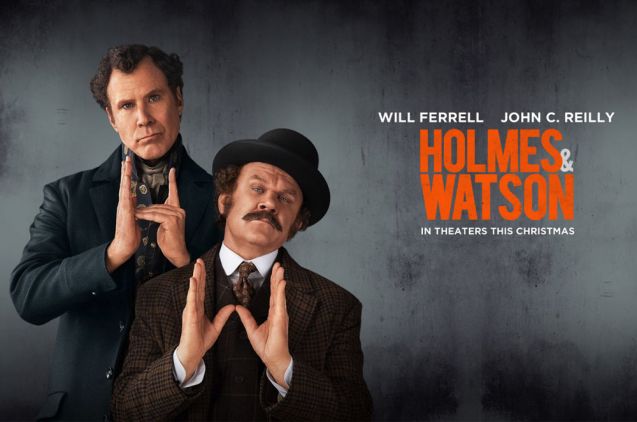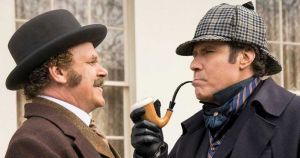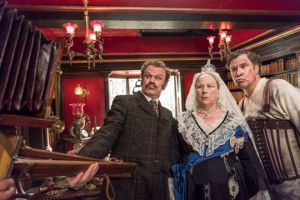It’s been five years since Will Ferrell and John C. Reilly have been in a movie together, and even then, Reilly’s cameo in Anchorman 2 barely counts. And yet, it seems like the duo had such good chemistry in Step Brothers that it may surprise you that they haven’t been in all that many films together. Well, Holmes and Watson comes along to right that wrong, or at least try to, with Ferrell and Reilly as the two classic characters. It doesn’t quite succeed.
Just like how a Will Ferrell and John C. Reilly reunion flick seems like an idea too good to fail, placing Sir Arthur Conan Doyle’s literary figures Sherlock Holmes and John Watson into a buddy comedy seems like comedy gold as well. So it’s all the more irritating that Holmes and Watson doesn’t live up to its potential. We’ve seen many iterations of the duo before, and while many people may not have read the original stories, it’s hard to find someone who isn’t aware of them. Whether it’s Robert Downey Jr. and Jude Law in the most recent movie series or Benedict Cumberbatch and Martin Freeman in the hit BBC show, there are certainly enough takes on the two characters for people to be familiar with them. Nevertheless, Holmes and Watson offers a sort of origin story for the mystery solving duo that proves to hinder the film rather than help it.
The story begins with a young Sherlock Holmes arriving at boarding school. After he’s teased and bullied for opening up to others, he decides to close himself off from feelings and use only his mind. He excels at his subjects in school and does make one friend with a certain John Watson. Years later, the two are still partners solving crimes, with Holmes getting the credit and Watson writing about their exploits in his novels. After a murder is committed at Buckingham Palace, it’s up to Holmes and Watson to track down number one suspect and classic rival James Moriarty before he kills Queen Victoria.
It’s immediately clear that Watson feels inadequate compared to Holmes, and this is what the movie decides will be the focus point of its story. In the novels and other adaptations, this isn’t really an issue since Watson is both a doctor and the presumably bestselling author of Holmes’ exploits. Even in this version, Watson is clearly both of those things, so it’s perplexing as to why he feels overshadowed by Holmes. The film tries to give a motive to Watson in that he also wants to be a world class detective, but with his own talents lying elsewhere it just feels unnecessary.
A lot of the problems with the film stem from issues like these. Instead of embracing the source material, Holmes and Watson is frequently at odds with it. Holmes is established early on as a great detective with an uncanny ability of perception, yet the film goes on to show him bumbling through the case and making mistake after mistake. One or the other would be funny, but trying to do both is just confusing. The film is also at odds with its setting. The strict social norms of Victorian era England are rife for parody, and the idea of making anachronistic modern day jokes in a period film is also amusing (at one point the due tries to take a “self-photograph” with the Queen). Both have been done before and done well, so a film would have to do a deep dive to make either work. Once again, Holmes and Watson tries to do both but won’t really commit to either.
As for its cast, Holmes and Watson presents another missed opportunity. People have wanted Will Ferrell and John C. Reilly to do another buddy comedy for years, so it’s perplexing as to why the film puts their characters at odds with one another for so long. Sure, the two of them beating each other up in slapstick fashion is amusing, but the subplot of Holmes not caring about Watson just doesn’t lend itself to that. Sure, Step Brothers begins with their two characters hating each other, but once they get over that, which they do surprisingly quickly, that film really gets going. Etan Cohen, writer and director of Holmes and Watson, doesn’t really seem to get that. Sure, the two titular characters eventually learn to appreciate each other’s talents, and the film picks up, but by that point it’s already two-thirds over. Great British actors including Hugh Laurie, Ralph Fiennes, Kelly MacDonald, and Steve Coogan also appear in the cast, and are criminally underused.
Nevertheless, Holmes and Watson doesn’t let everything go to waste. Rebecca Hall and Lauren Lapkus are highlights as Dr. Grace Hart and Millie, her feral patient who was raised by cats. Lapkus hardly speaks throughout the film, but her erratic actions and expressions are hysterical. It’s also worth noting that despite being misused as a duo, Ferrell and Reilly do get to show off their own comedic talents through their commitments to the film’s silly and often gross gags. Many of the jokes in the film go on for way too long, but there are a few quick ones that are sure to get people laughing. A certain cameo appearance towards the end that I wouldn’t dare spoil is particularly hilarious and unexpected.
Ultimately Holmes and Watson proves to be a great concept that is poorly executed. In some ways, it may have come out better if it ditched the Sherlock Holmes property entirely and just decided to tell the story of two friends who solve crimes. The end of this film seems to hint at a possible sequel. Since Will Ferrell and John C. Reilly’s Holmes and Watson would be working together instead of at odds with one another, that sequel may prove to be funnier. But for now, that’ll just have to remain a mystery.
Summary
Holmes and Watson never quite delivers on its promising concept of a comedic interpretation of Arthur Conan Doyle’s classic crime-solving duo. Its talented cast includes Will Ferrell and John C. Reilly as the two sleuths, but most of its players are given little to do.





